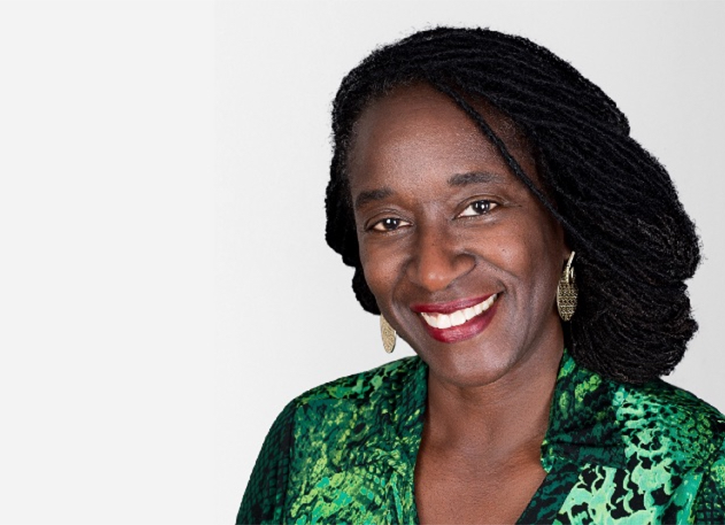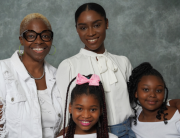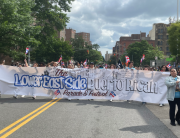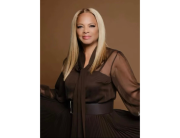In a world where anything can happen at any time, it’s important to recognize the people standing up, using their voice, and making a difference. With summer quickly approaching, there’s just one thing we can look forward to in the month of August: Black Philanthropy Month (BPM).
Back for its 11th year in a row, this year the anticipation has risen. Organized by the Women Invested to Save Earth Fund (WISE Fund), it was recently announced that the 2022 keynote speaker would be Ayo Tometi (fka Opal Tometi), co-creator of the Black Lives Matter movement and Diaspora Rising founder. The summit kicks off on August 3rd with a series of both in-person and virtual events taking place across the globe, including America, Africa, Brazil, Canada and the Caribbean.

Political analyst Bakari Sellers was revealed as the master of ceremonies. BPM was originally founded by Dr. Jackie Bouvier Copeland, standing as a global collective action to celebrate and empower Black giving in all its forms to aid racial equity and justice globally. Directly inspired by the late Dr. Martin Luther King, this year’s theme is Fierce Equity of Now: From Dream to Action.

Sheen Magazine spoke with Dr. Copeland via Zoom to find out more about her journey so far, the 2022 Black Philanthropy Month and much more.
Tell me a little bit about yourself and how you got your start?
Dr. Copeland: Essentially, I specialize in the art and science of making the world better. I’ve done that in various ways for over 40 years.
First, I’m a founder and an executive. My newest organization, founded in 2020, is The Women Invested to Save Earth Fund. We promote funding equity for women and people of color-led innovators to address the world’s most pressing challenges. It’s also the umbrella organization for other movements I’ve founded, including Black Philanthropy Month (BPM) and Reunity, a global coalition of Black women philanthropists that inspired and helped me organize the first BPM Summit starting as far back as 2021.
I combine my background as a funder and technologist so that WISE can fund people of color innovators worldwide with climate change technology solutions in the US, Brazil, Australia, all of Africa, the Caribbean and India. I’m very proud of our first cohort of WISE Leaders, who are doing everything from bringing solar and green jobs to Baltimore and creating drinkable water out of thin air in drought-stricken Kenyan communities.
As a scholar and professor, I’ve authored many books and articles, teach, speak, train, advise, and coach to inspire and inform people to make their visions for a better, more just future real.
Third, I am a creator, creating organizations and movements with others, but also using art including songwriting, singing, and poetry primarily to help heal people, society, and the planet—my life’s mission. I launched my very first studio album on April 15th called “Blachant” (pronounced Black Chant).
Can you tell us more about this album?
Dr. Copeland: In 2020, I was struggling with COVID isolation, the tragic murders of George Floyd, as well as the horrific California fires. I’ve always sung to manage personal stress and express joy. With the encouragement of my music producer, Grammy winner, Ben Williams, I wrote 9 of the album’s 12 songs. The album combines my Black music roots from Philadelphia and South Carolina as well as my exposure to diverse musical traditions from my global work and travels. It shares musical chants to promote a sense of inner peace and joy midst of the civil strife and chaos of the times
How would you describe the music on the album?
Dr. Copeland: It’s fusion music that blends the music of the Black church, jazz, R&B with my immersion in the Yoruba music of Nigeria where I’ve lived. It also includes chant traditions from the Catholic school masses I attended as a child with an undercurrent of the meditative, sacred music sounds of Hinduism, Buddhism, and Islam from my world travels.
When you listen to the album, you will notice that there are particular rhythms that are designed to help people connect to their ancestors, remember their culture, and calm their inner spirit, but also activate them to social action.
What made you decide to want to release this album?
Dr. Copeland: My singing practice was personal, almost like prayer for years, but then in 2020, COVID hit. If you remember that first quarter of the year, we were all discovering it was real, and then, I’ll never forget, on March 13, most cities in the country went on lockdown and we had to stay in our houses.
Soon thereafter, there were all these prominent violent attacks. Sometimes, police murders in our community. I found George Floyd’s killing especially traumatizing. I lived in Minneapolis for about 13 years, including the neighborhoods that were experiencing the violence and the uprising afterwards. I could look at them on TV and know exactly where they were, because that’s where I worked, where I shopped, where I lived much of my life in South Minneapolis.
I was living in California and California started burning; 2020 was the worst year for wildfires and it’s all related to climate change. And so, I quit my job at a tech company. I created the WISE Fund and through a series of coincidences, ended up being a jazz vocal student with a very prominent virtuoso jazz singer named Jose James, who encouraged me to go for my dream of creating a jazz healing album, and connected me with my music producer Ben Williams.
How would you like listeners to receive this album?
Dr. Copeland: My hope for the album is that “Blachant” can revive hope and action to help people get through this period of social disruption, mass grief and mourning, which is where we are now as a country and a world. I call it “Music for Change.”

Talk about how Black Philanthropy Month is part of this journey.
Dr. Copeland: Part of the WISE Fund includes Black Philanthropy Month that I officially founded a little over 10 years ago, although it’s been in development since 2001. It is a month in the year to celebrate love for humanity, which is what philanthropy is, and to push funding equity, equal access to philanthropy and venture funding for Black economic justice.
Women only get about 2% of the venture funding across the world. African Americans only get about 2% of the philanthropy funding, and just 1% or less of venture funding. Most people don’t know that based on a percentage of income, African Americans have one of the highest level of philanthropy in the US. It’s about $11 billion a year. We give a higher proportion of our income to charities and other kinds of organizations.
In fact, this is a global phenomenon. Philanthropy giving is hard wired into the cultures of Africa and its global Black diaspora. Since creating Black Philanthropy Month officially, the United Nations has twice recognized us as a critical cultural event, as part of their International Decade for people of African descent.
There are multiple cities and states in the US (about 45) that have made Black Philanthropy Month an officially recognized commemoration. Every August, with the help of many other leaders, you can’t build a movement like this alone, we have reached 60 countries and 19 million people, from inception. More countries now celebrate Black Philanthropy Month than celebrate Black History Month.
We will have our next global Black Philanthropy Month action and celebration summit starting August 3rd of this year. Our keynote speaker will be Ayo Tometi, one of the co-founders of Black Lives Matter. Noted journalist Bakari Sellers is also a keynote speaker.
In what ways is the Black Philanthropy Month a global concept?
Dr. Copeland: Black Philanthropy Month has always been international, even in its pre-history, as early as 2001. And today, we have simultaneous Black Philanthropy Month summits in the entire continent of Africa, Brazil, Canada, and the Caribbean, and we continue to grow.
We are very unique in that, I don’t think there are any other movements like ours that include the full diversity of Africa and its Black diaspora, as well as supportive allies, all celebrating the tremendous giving and civic contributions of our worldwide community.
We also have a special day on August 31st that recognizes the exceptional leadership of Black women in philanthropy in collaboration with The Women’s Philanthropy Institute of Indiana University’s Lilly School of Philanthropy. Black women’s creative leadership makes our philanthropy possible but often we are not acknowledged or written into the field’s history.
So, on the last day of Black Philanthropy Month, Black women and allies come together to celebrate our collective and individual contributions. It includes a Black Women Give Back Award. Starting in 2011, our sub-theme has been “Being Well While Doing Good” to remind ourselves of the importance of self-love and self-care as part of this global philanthropy and women’s movement.

How does the work extend beyond the month of August?
Dr. Copeland: We also have 10 Global Black Funding Equity Principles and a Pledge, whereby we’re trying to share with companies and other community funders, ways that they can promote equity in black communities, and really have a more accelerated impact because we have multiple organizations who have signed the pledge and are trying to make equity real within their organizations and communities.
This year at Black Philanthropy Month, we hope to launch the first ever Global Black Funding Equity program, recognizing funders doing exemplary work in supporting Black communities. We’re collecting nominations until June 15th.
What do you want people to take away from Black Philanthropy Month?
Dr. Copeland: I want the world to recognize that there is this movement of people, diverse Black people, who are using their time, talent, treasure, and voice to advance their communities, but also to promote a better world for all people. I’d like them to get involved. They can learn more about us at www.blackphilanthropymonth.com.
I’d like them to understand that we can all give. You don’t have to be rich. You can just give what you have. And when everyday people come together, pool their resources, their energy, their networks, and their ideas, change can happen.
Together, we can make a difference for our country’s and the world’s greatest challenges such as the distressing recent massacres in Buffalo and Uvalde. Philanthropy, giving all we can in any way you can, is more important than ever, and everyone can be a change agent.







Add Comment
You must be logged in to post a comment.